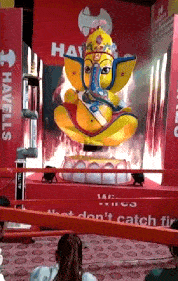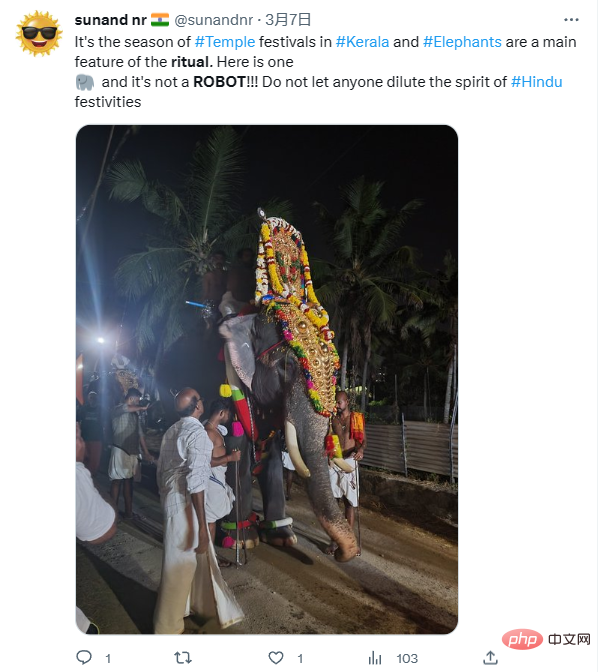Home >Technology peripherals >AI >Indians use AI cyber to make incense! Scholar: Robots may be more religious than humans
Indians use AI cyber to make incense! Scholar: Robots may be more religious than humans
- PHPzforward
- 2023-04-13 11:22:021619browse
Data shows that fewer and fewer young people believe in religion.
With the development of AI, robots, automation and other technologies, even religious clergy are beginning to be replaced by artificial intelligence.
ChatGPT Buddha can solve your problems, and the robot priest can recite prayers and preach. Believers and religious theologians alike were horrified.
To everyone’s surprise, India is at the forefront of the era of AI and machine automation, and was the first to begin “secularization” through modern new technologies.
Little Blue Bird VS. Little Yellow Chicken
Twitter’s competitor Koo, an Indian “Little Yellow Chicken” Weibo platform, is ahead of “Little Blue Bird” Twitter has taken a step forward and is the first in the world to integrate the ChatGPT function into the Weibo social platform.
After its launch in March 2020, Koo quickly “became the second largest multilingual Weibo platform in the world.”

Co-founder Mayank Bidawatka said the company is looking for ways to innovate the site and help users create better content. "We are always looking for ways to make it easy for our users to create content, and the integration with ChatGPT will provide creators with intelligent assistance at their fingertips."
Koo said this feature will assist Users write more profound posts. Through daily hot searches, ChatGPT helps creators draft their blog posts and helps users quote famous quotes and well-known quotations.
"We are the first Weibo platform in the world to integrate ChatGPT as part of the creative process, and we hope creators will be pleasantly surprised when using this smart tool."
However, some experts negatively believe that Twitter, Instagram and Facebook platforms are already full of AI-generated artwork and videos, and believe that the text content generated by ChatGPT will only swamp social media platforms. A matter of time.
However, where is this? What really caused controversy was the robots in Indian temples.
A robot will worship for you? Is this pious enough?
No, in India, even the worship ceremony does not require real people.

Ganesh Chaturthi (Ganesh Chaturthi) is the most massive festival in Hinduism, lasting for 12 days. Ganesa, the Indian elephant god, is the heaven of joy mentioned in later Buddhist scriptures. He is the son of Shiva and Parvati. He governs the world of wisdom, wealth, happiness, peace and love. wonderful things.
Aarti is also one of the most important worship rituals in Hinduism. This is a pious ritual that is usually performed five times a day. It requires monks to wave an odd number of rostrums from the god's head to his feet. A lit wick is soaked in ghee, and the lit wick is then passed to the devotees so that they can receive the blessings conveyed in the flame. Therefore, Aatri is also considered the "light of the soul."

#But now there is a mechanical arm specially designed to "wave", and it can even make the god float. There are a lot of things involved in the whole ceremony. Modern new technology, but some people have begun to question, is it pious enough to let robots perform such rituals?
Mechanical Elephant
Slightly less controversial is the mechanical elephant at a Kerala temple in India.
Path to never keep or employ live elephants or any other animals for rituals, celebrations, PETA gifted the temple with a lifelike mechanical elephant and gave it Named Irinjadappilly Raman.
We have all heard more or less about the mistreatment of wild elephants in captivity. Many elephants are scarred but still used for riding, rituals, and performance skills. etc. purpose.
Therefore, the promotion of this technology has been recognized by many caring people.
However, some people are very opposed to this move and insist on using wild elephants to perform the ceremony. He also appealed to everyone not to use mechanical elephants and not to dilute the spirit of Indian celebrations.

Japanese Buddha ChatGPT
If these automated religions created by India are still controversial, Japan’s recent ChatGPT Buddha is very popular and already has many believers.
This mechanical Buddha Hotoke AI has only been online for 5 days and has already solved the worries of more than 13,000 donors.

This AI is equipped with GPT-3.5-turbo and supports web and Line.
The mechanical Buddha that can answer human worries has brought many human beings to enlightenment.

Controversy
Some people think that automated religion is promising a bright, new, technological future for mankind, but some people They think this is the end of the world for them.
Some people worry that robots may lead more people to leave religious activities, but this is also a last resort. In the past few decades, the number of young people willing to devote themselves to religious causes has dropped significantly. .
With no need to worry about robots making mistakes, temples began to rely more on automation and no longer needed clergy to care for their gods.
Anthropology expert Holly Waters noted in an article that there are significant concerns about the use of robots in religious settings.
"Somehow, robots are better at worshiping gods than humans. They also trigger an inner shock in us: What is the meaning of life? What is one's place in the universe?"
Moreover, unlike humans, robots cannot be spiritually corrupted and can perfectly perform the orthodox practices of religion. This also makes them the most attractive alternative to the dwindling clergy.

But this also raises a more profound question, is it only what people believe in that counts as religion?
Anthropologists say: "Modern robotic technology is like a special cultural paradox. The best religion is one that does not involve humans at all."
"God became a human (Jesus), humans created machines, and machines are replacing God. This cycle forces us to re-examine the concepts of God and humans."
Reference materials:
##https://www.php.cn/link/29c08a4baebd25af6a2acf659cf834e8
The above is the detailed content of Indians use AI cyber to make incense! Scholar: Robots may be more religious than humans. For more information, please follow other related articles on the PHP Chinese website!
Related articles
See more- Technology trends to watch in 2023
- How Artificial Intelligence is Bringing New Everyday Work to Data Center Teams
- Can artificial intelligence or automation solve the problem of low energy efficiency in buildings?
- OpenAI co-founder interviewed by Huang Renxun: GPT-4's reasoning capabilities have not yet reached expectations
- Microsoft's Bing surpasses Google in search traffic thanks to OpenAI technology

